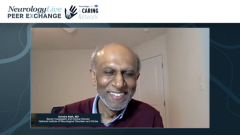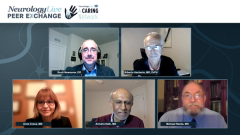
Priming the Immune System for MS
Anne Cross, MD, and Michael Racke, MD, discuss how the immune system is primed in multiple sclerosis.
Episodes in this series

Scott Newsome, DO: Mike, you’re an immunologist. You’ve done a lot of benchwork. From your perspective, when we think about priming the immune system and the various factors that go into priming the immune system to develop an autoimmune condition like MS [multiple sclerosis], how do you see that? How do you explain that to an individual? I’m still trying to wrap my head around 1 causative factor leading to MS, because I’ve always thought about it as a perfect storm. Can you talk to us a little about that?
Michael Racke, MD: There are a couple of things. (By the way, very nice work, Alberto.) When things of autoimmunity, when things like molecular mimicry—there was a paper by Jack Strominger and Kai Wucherpfennig years ago that looked at cross-reactivity between T cells in patients with MS vs a number of infectious agents, and of course, peptides from EBV [Epstein-Barr virus] came up. There’s recently been a paper from Bill Robinson and Larry Steinman’s group showing cross-reactivity and an antibody response between EBNA, which is the EBV nuclear antigen, and a molecule called glial cell adhesion molecule.
The other thing people don’t necessarily talk about as much is the idea that infections also shape the immune repertoire with an idea that it’s not just that I have to have molecular mimicry. I have to have infections in such a way that under certain conditions, if everything happens in the right way and under the right conditions, I can get an autoimmune response that’s dysregulated. For example, lots of papers have tried to link not only Epstein-Barr virus but also human herpesvirus type 6. There have been plenty of papers. Thomas Olson had a paper suggesting that CMV was protective. For Anne and me, MD also stands for mouse doctor.
How could some of these infections affect the immune repertoire in a way that you can get EAE [experimental autoimmune encephalomyelitis]? One thing that was interesting was a paper by Ray Welsh that showed that if you had multiple infections, that was in some sense protective, as opposed to if you had 1 infection. I’d almost say that Epstein-Barr virus—correct me if I’m misinterpreting this—is necessary but not sufficient. I hope that’s true, because I had infectious mononucleosis. You have to have it, but there have to be other things. You mentioned genetic background. That’s how you end up getting the frequency of MS occurring that’s much less than the population of people who got infected with EBV, similar to how there are plenty of people who are smokers who, for whatever reason, end up having protective factors, perhaps genetics, so that they don’t get lung cancer.
Scott Newsome, DO: I want to get Anne into the conversation. In your clinic, since Alberto’s paper got published—it’s widely available, and there’s a lot of buzz around it—what are you hearing from patients? Are you hearing from patients in the clinic who want to know more about this story? There are potential treatments in the pipeline that could be helpful. What are you hearing?
Anne Cross, MD: Congratulations, Alberto, on your fantastic piece of work that took so long to put together. So far, I’m not hearing a huge amount, but that’s partly because the paper is new. However, with some of my sophisticated patients, I’m hearing questions, including, “What could this mean in terms of treatment and even prevention down the road? Could there be vaccinations against Epstein-Barr?” It probably hasn’t been out long enough for a lot of patients to know about it, but I’m sure it’s coming down the pike.
Transcript Edited for Clarity
Newsletter
Keep your finger on the pulse of neurology—subscribe to NeurologyLive for expert interviews, new data, and breakthrough treatment updates.















